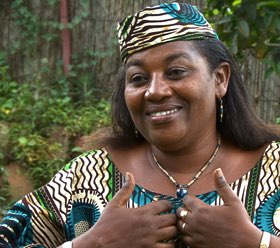Encounters with conflict and peace
Ideals

Rather than rebuilding a society which had already broken apart - even before the genocide - the new government was determined to build something new. One people, one country, open to all Rwandans regardless of ethnic identity. These were values which had never been experienced by any Rwandans in living memory, but built on shared ideas about the past.
Rwanda's history under Tutsi kings, the arrival of the Europeans, the growing divisions in Rwandan society, Rwanda's relationship with its African neighbours, Africa's place in a world dominated by western culture, China's economic influence... these are all areas which are shaping the new Rwanda. Rwandans are finding themselves regularly pushed to re-think what it meant to be African - what it means to be a Rwandan.
Tradition, education and intelligence
Why, in Rwanda of all places, did the ideals of restorative justice, reconciliation and forgiveness take hold at such a grassroots level? Some of the seeds of recovery can be found in Rwandan's familiarity with Christianity. Before the genocide, the majority of Rwandans regularly went to church - most were Catholic - and were familiar with concepts like forgiveness and reconciliation.
In post-apartheid South Africa, Nelson Mandela had recently become leader, and their Truth and Reconciliation Commission was exploring similar ideas as a way of dealing with long-standing divisions.

One of their first actions was to abolish the system of ethnic identity cards. Kagame, then thirty-six years old, insisted that everything the new government was asking Rwandans to do needed to be well explained.
Joseph Karemera, the first minister for health, describes the debate around forming the first government. “We knew we were unpopular. Hutus thought we were going to kill them, so we said, ‘let’s do the reverse to win their confidence.’ “ In an extraordinary mix of bridge-building and political intelligence, they chose Hutus as President and Prime Minister. Most of the new Cabinet were also Hutu.
Some of the RPF leaders didn’t agree with this decision. “We’d say that these are very bad people. He [Paul Kagame] said, ‘Bring them in and teach them to be good.’ ”
Reaching for the best in humanity

“And if, as it seems in Rwanda, this individual energy was encouraged at government and community levels, and if safe spaces were created for people to process the trauma, then that’s a rare combination of powerful factors and it’s not surprising that there have been remarkable stories emerging.”
So what are Rwandans doing to recover the best in humanity? How do they describe the process of healing? How, in some cases, are killers and survivors able to become friends?
< previous page | next page >
In this section
AN EXPERIMENT IN RECOVERY
Back from the edge
Experiment in recovery
A new Rwanda
JUSTICE
An overloaded system
The importance of justice
Teaching gacaca
Confronting the past
Soft justice?
Has gacaca delivered justice?
PEOPLE WHO KILLED
Helping killers
Sorry
MIND DAMAGE
Recovering from genocide
Living with the pain
Obstacles
Where does it hurt?
BUILDING PEACE
Breaking the cycle
Building peace

Back from the edge
Experiment in recovery
A new Rwanda
JUSTICE
An overloaded system
The importance of justice
Teaching gacaca
Confronting the past
Soft justice?
Has gacaca delivered justice?
PEOPLE WHO KILLED
Helping killers
Sorry
MIND DAMAGE
Recovering from genocide
Living with the pain
Obstacles
Where does it hurt?
BUILDING PEACE
Breaking the cycle
Building peace

